Quick Overview
Aging is a natural and inevitable part of life, and it’s a journey that can be embraced with vitality, joy, and good health. One of the keys to aging well is maintaining a healthy lifestyle that encompasses both fitness and nutrition.

Table of Contents
The Importance of Staying Active
Regular physical activity is a cornerstone of healthy aging. It provides numerous benefits for seniors, including;
- Maintaining Mobility: Exercise helps seniors to stay agile, reducing the risk of falls and injuries.
- Enhancing Cardiovascular Health: Physical activity can improve heart health, lower blood pressure, and reduce the risk of heart disease.
- Strengthening Muscles and Bones: Weight-bearing exercises help to maintain muscle mass and bone density, preventing age-related muscle loss and osteoporosis.
- Mood and Cognitive Benefits: Exercise releases endorphins, which can boost mood and cognitive function, reducing the risk of cognitive decline.
- Social Engagement: Many fitness activities provide opportunities for social interaction, reducing feelings of loneliness and isolation.
Learn about one of the common aging problem Low Back Pain Physical Therapy Exercises: Relieve Pain
Suitable Fitness Activities for Seniors
- Walking: Walking is a low-impact exercise that can be done almost anywhere. It’s gentle on the joints and promotes cardiovascular health.
- Swimming: Swimming or water aerobics are excellent choices for seniors, as they are easy on the joints and provide a full-body workout.
- Tai Chi: This gentle martial art focuses on balance, flexibility, and relaxation, making it ideal for seniors.
- Yoga: Yoga enhances flexibility, strength, and relaxation. Many yoga classes cater specifically to seniors.
- Strength Training: Lifting light weights or using resistance bands can help seniors to maintain muscle mass and strength.
The Role of Nutrition for Healthy Aging
Proper nutrition is equally essential for healthy aging. It supports overall health and can help to manage age-related conditions. Here are some nutrition tips for seniors;
- Balanced Diet: Consume a balanced diet rich in fruits, vegetables, whole grains, lean proteins, and healthy fats. This provides essential nutrients and energy.
- Hydration: Seniors should stay well-hydrated to support bodily functions and prevent dehydration, which can lead to various health issues.
- Calcium and Vitamin D: Adequate intake of calcium and vitamin D is essential for bone health. Dairy products, leafy greens, and fortified foods are good sources.
- Fiber-Rich Foods: Include fiber-rich foods like whole grains, legumes, and vegetables in your diet to support digestive health.
- Limit Sodium and Sugar: Reducing salt and sugar intake can help to manage blood pressure and blood sugar levels.
- Protein: Seniors should ensure that they get enough protein, which supports muscle and tissue repair. Lean meats, fish, eggs, and plant-based sources like beans and nuts are good choices.
Nutrition tips for seniors
As you age, your body’s needs change. You may need fewer calories, but you still need to get all the essential nutrients. Some nutrition tips for seniors include;
- Eat plenty of fruits and vegetables: Fruits and vegetables are packed with vitamins, minerals, and antioxidants that are important for good health.
- Choose lean protein sources: Protein is essential for building and maintaining muscle mass. Good lean protein sources for seniors include chicken, fish, beans, and tofu.
- Limit processed foods and sugary drinks: Processed foods and sugary drinks are low in nutrients and high in unhealthy fats, which can increase the risk of chronic diseases.
- Get enough calcium and vitamin D: Calcium and vitamin D are important for bone health. Good sources of calcium include dairy products, leafy green vegetables, and fortified foods. Good sources of vitamin D include sunlight, fatty fish, and fortified foods.
- Drink plenty of water: Staying hydrated is important for overall health. Aim to drink eight glasses of water per day.
Consulting a Healthcare Professional
Before beginning a new exercise or diet regimen, it’s essential for seniors to consult with a healthcare professional. They can provide guidance tailored to individual needs, taking into account any existing health conditions or medications.
